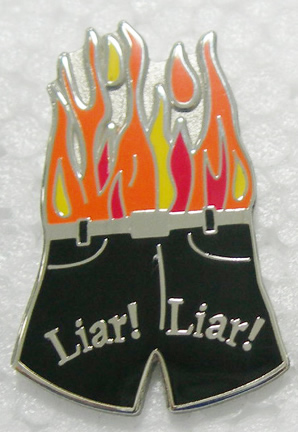Close window | View original article
Liberty and the Right to Lie
Ordinary lying shouldn't, and can't, be illegal.
News of today's latest judicial atrocity comes to us from Politico:
In a major First Amendment decision Tuesday, the U.S. Court of Appeals for the 9th Circuit struck down a federal law making it a crime to falsely claim a military honor or decoration... Judge Milan Smith, writing for colleague Thomas Nelson, said the law went too far, even though many legal experts view deliberately false speech as unprotected by the Constitution. [emphasis added]
So, to the ephemeral Constitutional "right" to privacy, "right" to murder your unborn child, and pending "right" to "marry" someone with whom you are inherently biologically and physically incompatible can be added a right to lie through your teeth. Used-car dealers and politicians, rejoice!
Except that in this case, the judge is right, and the moralizers are wrong. Listen to the judge's written opinion:
We have no doubt that society would be better off if Alvarez [the defendant, a proven liar] would stop spreading worthless, ridiculous, and offensive untruths. But, given our historical skepticism of permitting the government to police the line between truth and falsity, and between valuable speech and drivel, we presumptively protect all speech, including false statements, in order that clearly protected speech may flower in the shelter of the First Amendment. [emphasis added]
There are a whole host of things that are morally wrong and reprehensible to the point that all decent and reasonable people should avoid and look down upon then, and yet which government has no business policing. Most Americans of all political stripes would agree that adultery is wrong, for example, but do any of us want the police breaking down bedroom doors and hauling adulterers off to prison or to be stoned to death? No.
|
|
| Not a crime in progress. |
|---|
How about lying? The judge's ruling shines a powerful spotlight on the problem: if lying is a crime, then the government gets to decide what is a lie. Anyone with a pulse in the last couple years knows that our political arena is constantly criss-crossed with accusations of lying, from Rep. Joe Wilson vs Obama on down to the meanest pundit.
Do we really want the government to be in the business of deciding who is lying, as a general rule? We've just seen an example of why that's a bad idea, when California Judge Walker ruled that six thousand years of societies arranging marriages around a man and a woman and considering homosexual relationships to be "something else" at the very best, was nothing more than a bigoted, biased, and bogus lie. If that's the way the government distinguishes lies from truth, they have no business going there.
There are some situations where lying is and ought to be illegal: lying to the court, for example. We call this perjury, obstruction of justice, and contempt of court. You can also go to jail if you con money out of someone by lying to them; this is fraud by deception or some other form of consumer fraud.
In normal daily life, though, people lie all the time. Alvarez claimed to have military honors he didn't earn; this makes him a dastardly scoundrel. Unless he got money from someone under false pretenses, however, there is no crime here, and the judge's ruling is the right one.
There is such a thing as absolute truth - either Alvarez received the Medal of Honor, or he did not; either Obamacare will change the level of care you're allowed to get or it will not; either taxes will be raised or they will not. Being a free people means that we get to make our own decisions about who is lying and who is telling the truth and hopefully express them at the polls and elsewhere using our other rights of free speech and freedom of the press.
Just because we don't like something someone is doing - just because it's morally wrong, even - making moral failings into crimes generally only makes the situation worse.
That government is best which governs least.
